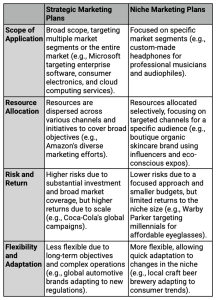Strategic Marketing Plans vs. Niche Marketing Plans: Which Is the Best Fit for Your Business Goals?

In my experience working with CEOs, founders, and owners, marketing planning is one of the biggest challenges businesses face. A recent report from Constant Contact reveals that many leaders feel overwhelmed by the complexities of marketing and often struggle on how to effectively market their products or services.
Consider this: 73% of those surveyed admitted they were uncertain if their current strategy was actually helping them achieve their business goals. Even more striking, 67% of businesses reported not having a marketing plan in place at all. Without a solid plan, businesses risk operating reactively instead of proactively–missing opportunities to drive targeted growth and gain a competitive advantage.
This uncertainty often stems from a fundamental misunderstanding of what marketing planning entails. One critical step in overcoming this hurdle is recognizing the difference between having a clear strategy versus relying on scattered tactics.
The Trap of Confusing Strategy with Tactics
One of the most common mistakes I see is conflating strategy with tactics. Simply put, strategy is the big-picture blueprint that sets long-term objectives and the direction for your business. In contrast, tactics are the specific, short-term actions or tools used to execute that strategy.
It’s a seemingly small distinction, but it’s a critical one. When businesses fail to differentiate between the two, their marketing efforts often become fragmented and lack focus, leading to wasted resources and missed opportunities.
A marketing plan should never be a collection of isolated tactics. Instead, it must serve as a strategic framework that guides decision-making across every aspect of the organization—from resource allocation to campaign execution.
Strategic vs. Niche Marketing Plans: A Crucial Distinction
Another common source of confusion lies in the difference between strategic marketing plans and niche marketing plans. While both aim to drive business growth, their approaches are fundamentally different:
- Strategic Marketing Plans provide a broad, long-term roadmap that aligns with the overall direction of the business.
- Niche Marketing Plans focus on targeting specific market segments or addressing particular needs within a larger industry.
The key to success is understanding when and how to use each type of plan. Applying the wrong approach at the wrong time can slow growth or, worse, lead to stagnation.
That’s why, in this article, I’m breaking down the key differences between strategic and niche marketing plans, exploring their benefits, challenges, and when to use them. By understanding these distinctions, you can make smarter decisions about which approach will best support your goals. With the right plan in place, your marketing efforts will no longer feel like a guessing game but rather a powerful tool for driving sustainable growth.
Strategic Marketing Plans: Long-Term Growth Blueprints
A strategic marketing plan provides a comprehensive, long-term roadmap to achieve your business’s core objectives. It aligns marketing efforts, focusing on how to reach and engage target audiences, increase brand visibility, and drive growth.
The plan typically includes both business goals and specific marketing objectives, such as entering new markets, increasing market share, improving customer retention, or scaling operations.
These plans are ideal for businesses aiming to:
- Enter New Markets: Identify opportunities, tailor messaging, and build a competitive position in untapped regions or industries.
- Expand Locations and Geographies: Strategically grow your presence by targeting key areas with high growth potential and customizing campaigns to local market needs.
- Scale Operations: Optimize marketing efforts to support growth across multiple products, services, or geographic locations.
- Plan for Growth: Set clear objectives and measurable milestones to guide sustained growth and adaptability in changing market conditions.
Strategic marketing plans typically include these core components:
- Market Analysis: Understanding your target market, customer segments, and competitive landscape.
- Marketing Objectives: Defining clear, measurable goals aligned with business priorities.
- Channel Strategies: Specific plans for each marketing channel, including digital, social, and other channels.
- Budgeting: Allocating funds and resources effectively to maximize return on investment (ROI) across different channels, lead sources, and campaigns.
Case Study Example: Financial Services Growth
A credit and consumer data company achieved a 40% revenue increase in 12 months by simplifying messaging, optimizing their website, and executing targeted digital campaigns. These strategic efforts enhanced their reputation, increased lead volume, and supported M&A growth objectives.
Client
A Major Financial Credit and Consumer Data Company (now part of Deluxe)
Objective
Scale operations, expand the customer base, and increase value for mergers and acquisitions (M&A).
Approach
We developed a strategic marketing plan that focused on expanding into new target markets, simplifying messaging using the StoryBrand framework, and building an integrated marketing strategy and lead funnel. The plan included optimizing the website for better user experience and conversion, creating high-value content tailored to specific target audiences and decision-makers, and executing multi-channel digital campaigns to build awareness, acquire new customers, and retain existing ones. We also provided sales enablement, including laying out the sales process, playbooks, pitch decks, and email templates, etc., to improve outreach efforts.
Outcome
The strategic marketing efforts led to a 40% revenue increase in 12 months, a 235% increase in lead growth through targeted campaigns, and improved visibility and reputation in the financial industry, all of which helped increase the company’s value for M&A activities.
Niche Marketing Plans: Focused Growth for Specialized Audiences
Niche marketing plans concentrate on targeting smaller, well-defined market segments rather than casting a net on a broad audience. These plans are designed to identify and capitalize on unique opportunities within specialized demographics or industries.
These plans are ideal for businesses aiming to differentiate themselves in competitive markets or address specific customer needs. By focusing on a defined audience, niche marketing aims to create tailored solutions that resonate with the specific needs, interests, and challenges of that group.
Niche marketing plans typically include these core components:
- Audience Segmentation: Detailed analysis and segmentation of a specific market, identifying the unique characteristics and needs of the target group.
- Personalized, Tailored Messaging: Marketing messages that speak directly to the concerns and desires of the niche audience.
- Targeted Media Channels: Choosing the most effective and relevant channels for reaching the audience, whether through specialized digital platforms, industry-specific events, or exclusive media.
Niche marketing plans are ideal when you need:
- Targeted Demographics: Targeting specific demographic groups or industries that require specialized attention.
- Market Differentiation: A business is looking to stand out in a saturated market by offering unique products or services.
- Reputation Building: Companies with specialized offerings want to improve their reputation and visibility within a highly focused segment.
These plans are particularly useful for businesses operating in niche markets where broad strategies may not be effective. They allow companies to concentrate resources and efforts on the areas where they can make the most impact.
Case Study Example: HealthTech Revenue Growth
A HealthTech company doubled its revenue in one year by targeting acute care providers with tailored messaging, direct marketing, and partnerships with industry influencers. The niche-focused strategy positioned the company as a leader in their specialized market.
Objective
Double revenue by strengthening the digital presence and improving lead conversion rates.
Approach
We implemented a niche marketing plan targeting acute care departments within larger healthcare facilities, such as critical care, emergency, and specialized acute care units. The plan included:
- Offering technology solutions specifically designed for acute care environments, including patient monitoring systems and data analytics for optimized patient care.
- Developing tailored messaging that addressed the unique pressures of acute care providers, focusing on the importance of rapid data access and reliability during critical moments.
- Using targeted lead-generation strategies, such as direct marketing, partnerships with industry influencers, and participation in healthcare conferences focused on acute care innovation.
Outcome
These efforts helped position the HealthTech company as a leader in innovative solutions for the acute care sector. By focusing on this niche, the company increased its market share and reputation and ultimately doubled its revenue within one year. This case highlights the power of a well-executed niche marketing plan to drive growth in specialized markets.
Which Plan Is Right for Your Business?
When choosing between a strategic or niche marketing plan, consider the following:
1 – Goals:
- For broad, long-term objectives (e.g., scaling or market entry), a strategic plan is ideal.
- For targeting a specific segment or standing out in a niche, choose a niche plan.
2 – Market Conditions:
- In dynamic markets, strategic plans offer the flexibility to adapt.
- In stable markets, niche plans enable focused efforts and a competitive edge.
3 – Resources:
- Strategic plans often require greater investment and a larger team.
- Niche plans are more resource-efficient, concentrating on specific channels and audiences.

Partnering with Experts to Choose the Right Marketing Plan
Choosing the right marketing strategy is key to reaching your business goals, and partnering with a strategic marketing expert like Rutkin Marketing can provide valuable support in making this decision. We specialize in helping businesses determine the most effective approach, whether a broad strategic marketing plan or a more targeted niche marketing plan, based on your business’s unique objectives and needs.
The first step is making sure your marketing plan is in line with your business goals.
- A strategic marketing plan is the way to go if you’re aiming for long-term growth and want to reach a broad audience.
- A niche marketing plan might be a better fit if you’re looking to target a specific market or stand out in a particular segment.
We also take a good look at your market conditions, as they play a crucial role in guiding you in the right direction, which we achieve by:
- Analyzing trends to understand current and emerging market dynamics.
- Evaluating customer behaviors to identify needs and preferences.
- Study competition to pinpoint opportunities and challenges.
If you’re in a fast-moving industry, a strategic marketing plan can give you the flexibility you need to adjust quickly. But if your market is more stable, a niche plan might help you focus your efforts and gain an advantage.
Finally, we consider your available resources:
- Strategic marketing plans typically require a larger investment because they cover a wide range of channels and target broader markets.
- Niche plans are more focused and require fewer resources since you’re concentrating on a specific audience.
We’ll work with you to evaluate your budget, team, and tools so your chosen plan best suits your resources and delivers the best possible return on investment.
